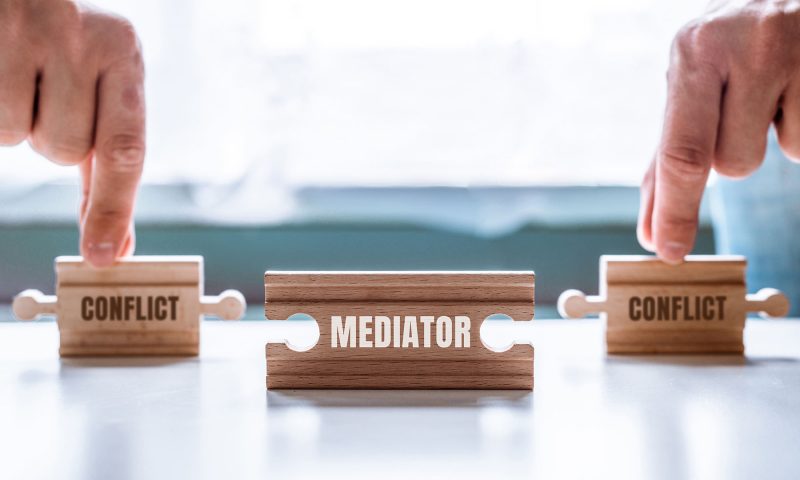back
State-Guaranteed Mediation To Facilitate Access To Justice For Vulnerable People

Picture symbol (Source: Shutterstock.com)
People could save money and time by resolving their disputes amicably instead of going to court. Although the mediation service offers this possibility, individuals and legal entities do not request it too often, especially because they do not know how to request it. Although the legislation of the Republic of Moldova provides for state-guaranteed mediation, no sufficient procedures and mechanisms have been developed in practice, which would make it possible to implement this service. The authorities promise to intervene promptly to facilitate access to justice for vulnerable people.
A cheap, confidential service, yet... still unknown
During 2020-2021, the Mediation Council of the Republic of Moldova examined 1874 disputes of individuals and legal entities, and 1841 of them (about 98%) were settled amicably. Mediator Dumitru Lefter, director of the Mediation Center of the Chamber of Commerce and Industry, believes that the number of beneficiaries would be much higher if people knew better the benefits of mediation. "Through mediation, a dispute can be settled in maximum three weeks, compared to two or three years for a court trial. Another advantage is confidentiality, as the mediation decision is not made public. But the main thing is that the parties find a convenient solution that allows them to maintain good relations in the future," D. Lefter says. In her turn, Felicia Chifa, the president of the Mediation Council of the Republic of Moldova, also mentions the low costs of mediation compared to those related to a complaint filed in court. "When a complaint is examined in court, one must pay for the lawyer, the state tax, etc., while in mediation, they must only pay the mediator's fee which is agreed between the parties and varies depending on the complexity of the case, the amount of the case, and the number of meetings needed to mediate the case.”
The Law on Mediation, adopted in 2015, includes several categories of disputes that can be resolved through mediation, including breach of contractual obligations, collection of debts from individuals and legal entities, individual labor disputes, but also cases of damage after procurement of services or material goods. Different family cases can also be settled: exercise of parental rights and obligations, sharing of property or establishment of a child's place of residence, maintenance of children, etc. Mediation can also be requested for criminal cases: battery, culpable bodily harm, traffic accidents, etc.
Parties may request a mediator’s services even if their case is pending in court
Livia Mitrofan, a judge at the Chișinău District Court, Centru Office, recommends that litigants go to the mediators first, when they have a conflict that can be resolved amicably. At the same time, even if the parties have already reached the court, they can also request the help of a mediator, enjoying certain state tax exemptions. According to the magistrate, if a case is in the first instance court and the conflict has been settled amicably with a mediator’s help, the state tax shall be refunded in full. If the parties reconcile when the case is in the appellate court, 75 percent of the tax shall be refunded, and when the parties reconcile in the second appeal court, 50 percent of the tax shall be refunded.
No mechanisms have been developed so far in the Republic of Moldova to implement state-guaranteed mediation for civil and misdemeanor cases; it exists only for criminal cases. "State-guaranteed mediation has not been fully implemented because the procedure is complex, there is a lot of bureaucracy, and mediator fees are very low. We want the state-guaranteed mediation service to benefit people with a monthly income lower than the minimum living standards as well as people with disabilities and children, and these criteria should be clearly stipulated in the law," Felicia Chifa specified.
In a recent public discussion, Veronica Mihailov-Moraru, Secretary of State of the Ministry of Justice, said that developing the mediation service is one of the objectives of the Government Action Plan and the policy document on justice reform: "It is important to have quality mediation services. Moreover, these services need to be included in state-guaranteed aid to ensure that vulnerable people have access to justice, and to that end, legislation needs to be reviewed. According to Veronica Mihailov-Moraru, the Ministry of Justice is drafting a regulatory act that would ensure the functionality of state-guaranteed mediation, would establish the categories of people who can request this service, the institutions and the enforcement procedure.
There are about 170 mediators in the Republic of Moldova. To become a mediator, any person must have a bachelor's degree and a certificate confirming completion of the initial training courses for mediators. People interested in mediator services can access their list on the website of the Ministry of Justice Justice.gov.md as well as on the website of the Mediation Council Mediere.gov.md.
Mariana Jacot,
Association of Independent Press (API)
